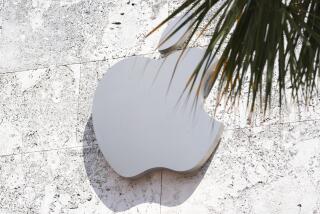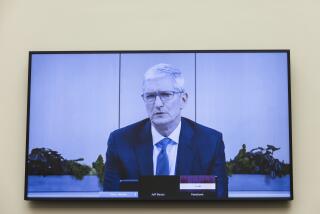Apple skirts U.S. taxes, panel finds
- Share via
WASHINGTON — Apple Inc., one of the most successful and valuable companies on the planet, will be tested Tuesday when Chief Executive Tim Cook testifies about the company’s controversial tax practices before a hostile Senate subcommittee.
Should the company, as Apple and Cook argue, be applauded for creating hundreds of thousands of jobs and paying $6 billion in federal taxes last year, among the most of any U.S. corporation?
Or should Apple be reviled for stashing a hoard of cash overseas so it could legally skirt an additional $15 billion in taxes over four years, making it potentially one of the country’s biggest tax avoiders?
“Apple wasn’t satisfied with shifting its profits to a low-tax, offshore tax haven,” said Sen. Carl Levin (D-Mich.), the subcommittee chairman and longtime advocate for tightening U.S. corporate tax laws. “Apple sought the Holy Grail of tax avoidance.”
The showdown over the company’s aggressive tax practices will take place before the Senate Permanent Subcommittee on Investigations, which has been conducting a wide-ranging investigation into corporate offshore tax practices.
Cook and two other company executives are expected to respond to a subcommittee report released Monday that said the company used an elaborate web of offshore subsidiaries to avoid paying at least $15 billion in U.S. taxes on $44 billion in foreign income from 2009 to 2012.
And that wasn’t the company’s total foreign earnings during those years — or the total U.S. tax avoided, the subcommittee said. Those figures were not in the report.
Many of the tactics, such as cost-sharing arrangements, are common among large multinational corporations seeking to shift profits to countries with lower tax rates. The investigation did not find that Apple violated any laws.
But Apple apparently did add its own innovation to skirting taxes: Three of its subsidiaries in Ireland claim to have no responsibility to pay income taxes to any country, according to the subcommittee’s 40-page bipartisan report.
One of those subsidiaries, Apple Operations International, which has no employees but reported $30 billion in income over the four years, has not filed an income tax return in any country for the last five years, the investigation found.
Subcommittee investigators said they had never seen companies that claimed to have no responsibility to pay income taxes to any country.
The decision by Cook and two other high-ranking Apple executives to appear in such a highly public forum is extremely rare. It’s the type of venue Apple executives have typically avoided because it does not allow for the kind of tightly controlled, highly scripted exchanges in front of adoring crowds that the company has used with great success to pitch new products.
Along with Cook, Apple’s chief financial officer, Peter Oppenheimer, and its head of tax operations, Phillip Bullock, are scheduled to testify at the subcommittee hearing on offshore profit sharing.
In written testimony prepared for the hearing, Apple unveiled a two-prong strategy for fighting back. First, Apple said the company is “a powerful engine of job creation in the U.S.” and “pays an extraordinary amount in U.S. taxes.”
Apple said it does not use “tax gimmicks.”
“Apple has substantial foreign cash because it sells the majority of its products outside the U.S.,” the company said.
Second, Apple argued that the strategies that seem to have outraged some committee members really point to the need for wide-ranging corporate tax reform to encourage companies to bring back large piles of cash they have parked in bank accounts overseas.
Cook said last week that he planned to urge lawmakers to simplify corporate tax laws dramatically. Among the changes he planned to propose was to lower the rate paid on foreign earnings brought back to the U.S. The company’s written testimony reiterated those points but did not provide further details.
Companies can stash foreign earnings abroad and do not have to pay U.S. taxes on the money until it is brought back to the U.S. The subcommittee report cited private estimates that U.S. multinational companies have more than $1.7 trillion in foreign earnings parked overseas.
Of Apple’s $145 billion in cash as of April, about $102 billion is overseas. By keeping profits offshore, the company was able to reduce its effective tax rate to as low as 24.2% in 2011.
Republicans also have pushed for reducing the tax rate on foreign earnings by U.S. firms. But they are at odds with President Obama and many Democrats who want to set a new minimum tax rate on foreign corporate profits, even if they are never brought back to the U.S. in a process known as repatriation.
Apple’s argument for tax reform may get a rough reception from some lawmakers on both sides of the aisle incensed with its tax practices.
Sen. John McCain (R-Ariz.), the subcommittee’s top Republican, called Apple’s tax avoidance “egregious and really outrageous.”
“Apple executives like to boast that their company is the highest corporate taxpayer in the U.S., but what they often leave out,” he said, “is that Apple is one of the largest corporate tax avoiders. They’re not the only ones, but they’re the most egregious offender.”
Edward D. Kleinbard, a USC law professor, said Cook may find himself in a difficult situation.
“If Apple is in fact a massively successful generator of stateless income, it will be extremely interesting to hear Mr. Cook’s explanation about why the U.S. should reward strategies that produce no tax anywhere in the world with any kind of repatriation holiday,” said Kleinbard, a former chief of staff on Congress’ Joint Committee on Taxation.
“Levin will spend the bulk of the time using Apple as a case study — not as an opportunity to give Apple a platform to dress up its tax agenda with a tax reform proposal,” he said.
According to the subcommittee report, Ireland is key to Apple’s tax strategy. The country has a 12% statutory tax rate, though Apple has negotiated a rate of less than 2% on its operations there.
From 2009 to 2012, Apple shifted $74 billion in income from sales outside of North and South America to Apple Sales International in Ireland through complex cost-sharing agreements. For those four years, the company paid less than 1% in taxes on those sales, well below even the low rate it had negotiated with Ireland, the report said.
For example, Apple Sales paid $10 million in taxes on $22 billion in earnings in 2011, resulting in a tax rate of 0.05%, the report said.
Apple told subcommittee investigators that Apple Sales, along with Irish affiliates Apple Operations International and Apple Operations Europe, are not responsible for paying taxes in Ireland because they are not managed or controlled in that country, a requirement under Irish law.
And they are not required to pay taxes in the U.S. because they aren’t physically located here.
In its prepared testimony, Apple said that it began operations in Ireland in 1980 and that its subsidiaries there, including a fourth one, Apple Distribution International, “employ nearly 4,000 people and pay taxes there as required by Ireland.”
More to Read
Inside the business of entertainment
The Wide Shot brings you news, analysis and insights on everything from streaming wars to production — and what it all means for the future.
You may occasionally receive promotional content from the Los Angeles Times.












